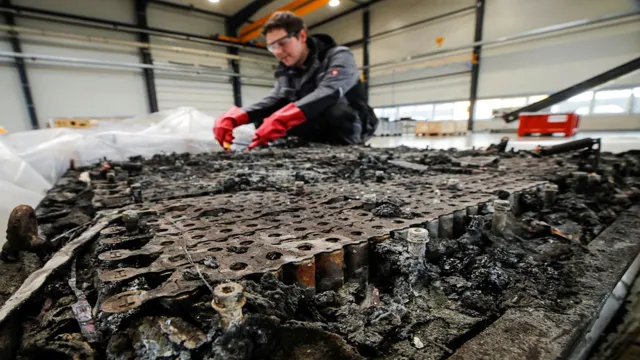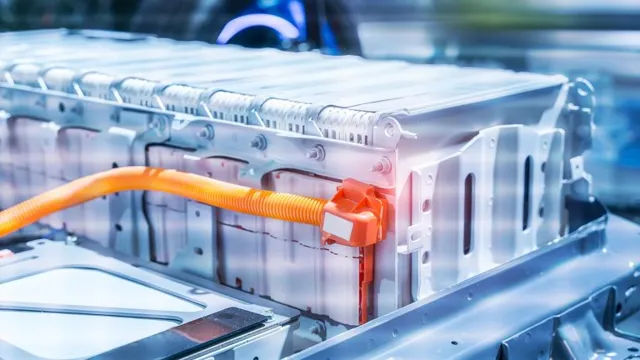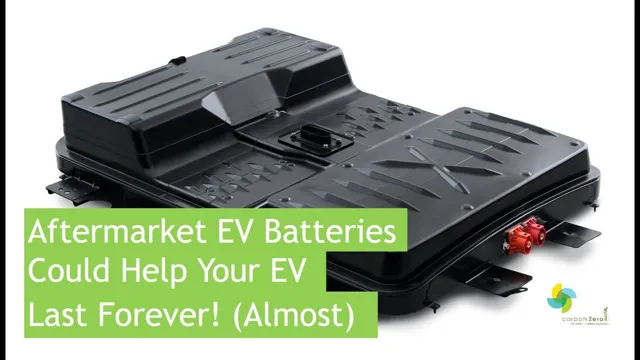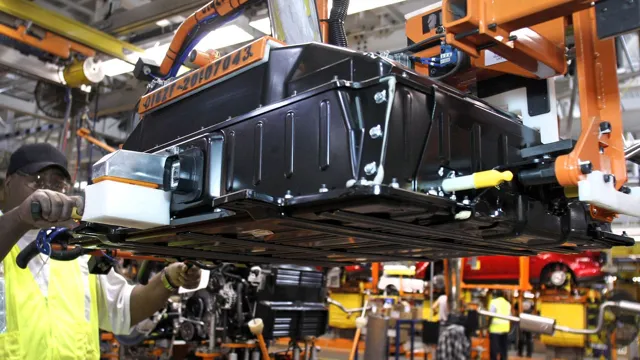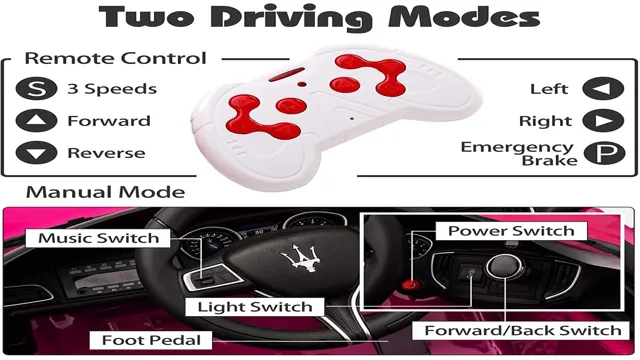Revolutionizing Electric Car Industry: Safe and Sustainable Lithium Battery Disposal Methods
As the world is shifting towards renewable and sustainable energy sources, electric cars have emerged as a popular choice for transportation. One of the critical components of electric cars is lithium-ion batteries that power the vehicles. While these batteries are environmentally friendly and efficient, there’s also a growing concern about how to dispose of them when they reach their end-of-life phase.
Electric car lithium battery disposal is an issue that needs our attention. The batteries are durable, with an average lifespan of 8-10 years, but once they reach their end-of-life, they pose a significant environmental threat. Most of these batteries end up in landfills, where they can leak harmful chemicals and metals into the soil and water.
However, there’s a solution to this problem. Instead of disposing of these batteries, they can be recycled to recover valuable materials and reduce the waste that ends up in landfills. Recycling lithium-ion batteries requires a complex process that separates the different components of the battery, such as metals, plastics, and electrolytes.
These components are then reused in the production of new batteries, reducing the need for mining new materials. In conclusion, electric car lithium battery disposal is a pressing issue that needs to be addressed. As consumers, we must be aware of the environmental impact of these batteries and ensure they are recycled correctly to minimize waste and pollution.
By recycling lithium batteries, we can preserve natural resources, reduce carbon emissions, and pave the way for a sustainable future.
Overview
When it comes to electric cars, the lithium batteries used to power them are a crucial component. However, there comes a time when these batteries need to be replaced, and disposing of them properly is important for both environmental and safety reasons. Luckily, there are several ways to recycle or repurpose lithium batteries, including using the materials for other products or repurposing them in other vehicles.
Additionally, many car manufacturers have developed programs to ensure that these batteries are properly disposed of, which not only keeps the environment safe but also helps reduce the amount of waste in landfills. So, while properly disposing of lithium batteries may seem like a daunting task, there are many options available to ensure that these valuable resources are put to good use and kept out of harm’s way.
What are lithium-ion batteries?
Lithium-ion batteries are a type of rechargeable battery commonly found in electronic devices such as laptops, cell phones, and cameras. They have become increasingly popular due to their high energy density and long lifespan. Unlike traditional batteries, which use metal electrodes, lithium-ion batteries use a lithium-ion (Li-ion) compound to store energy.
This makes them lighter and more compact, allowing them to power smaller devices and last longer between charges. However, they can be sensitive to high temperatures and improper charging, which can cause them to overheat and potentially burst. Nonetheless, as technology continues to advance, lithium-ion batteries are likely to remain an important part of our daily lives.
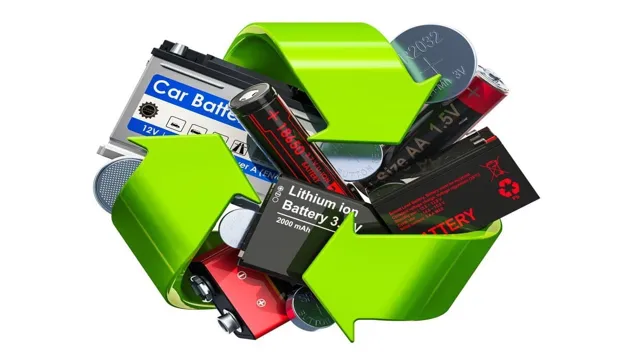
The environmental impact of lithium-ion battery disposal
Lithium-ion batteries are popularly used in numerous devices, including cell phones, laptops, and electric cars, due to their high energy density and long lifespan. However, their disposal has increasingly become an environmental concern. When these batteries aren’t disposed of correctly, they can release harmful chemicals such as cobalt, nickel, and lithium into the environment, causing severe damage to the ecosystem.
These chemicals can seep into water bodies, soil, and plants, negatively affecting wildlife, crops, and human health. The improper disposal of lithium-ion batteries could also lead to the emission of greenhouse gases, contributing to climate change. Therefore, it’s essential to dispose of these batteries correctly through designated recycling centers to mitigate their environmental impact.
Current regulations on lithium-ion battery disposal
Lithium-ion batteries have become a popular power source for electronic devices, but their disposal can pose a challenge. As these batteries contain toxic chemicals and heavy metals, improper disposal can lead to significant harm to the environment. To combat this, several countries have developed regulations surrounding the disposal of lithium-ion batteries.
In the United States, for example, the Environmental Protection Agency has classified these batteries as hazardous waste and offers guidelines for their safe disposal. Many retailers also offer recycling programs where consumers can drop off their used batteries for proper disposal. It’s important to take the proper precautions when disposing of lithium-ion batteries to protect both the environment and human health.
Options for lithium-ion battery disposal
When electric car lithium-ion batteries reach the end of their useful lifespan, they need to be properly disposed of to avoid environmental harm. Fortunately, there are a few options for disposal that can help minimize waste and pollution. The most common option is recycling, which involves extracting valuable metals like lithium, cobalt, and nickel from the dead batteries and using them to manufacture new ones.
Another option is repurposing, which involves finding a new use for the batteries instead of sending them to a landfill. Some examples include using them to store energy from solar panels or wind turbines, or even repurposing them for use in electric bicycles or boats. Regardless of the method used, it’s important to ensure that lithium-ion batteries are disposed of correctly to protect both the environment and human health.
Recycling vs. landfill disposal
As lithium-ion batteries become increasingly prevalent in our daily lives, the issue of proper disposal becomes more pressing. Recycling and landfill disposal are two of the most common methods for disposing of these batteries, but which is the better option? Recycling is undoubtedly the more environmentally friendly choice, as it allows for the recovery of valuable materials such as cobalt and nickel rather than simply burying them in a landfill. However, the technology for recycling lithium-ion batteries is still developing, and there are concerns about the feasibility of large-scale recycling efforts.
Landfill disposal, on the other hand, is a more straightforward method, but it poses its own set of drawbacks. The chemicals from the batteries can potentially leak into the soil and water, leading to environmental damage. Ultimately, the best course of action is to reduce the need for battery disposal altogether by using rechargeable batteries and properly storing and maintaining them to extend their lifespan.
When disposal is necessary, researching and utilizing reputable recycling facilities should be the preferred choice.
How lithium-ion batteries are recycled
Lithium-ion batteries have become increasingly popular due to their energy density and long lifespan. However, their disposal can pose a challenge, as they contain toxic elements such as cobalt, nickel, and lithium. Fortunately, there are various options for lithium-ion battery disposal, including recycling.
The recycling process involves breaking down the batteries into their component parts and then separating and refining the materials. This recycled material can then be used to manufacture new batteries or other electronics. By recycling lithium-ion batteries, we can reduce the need for mining and conserve natural resources.
So, the next time you need to dispose of a lithium-ion battery, consider recycling it instead. By doing so, you’ll not only be taking a step towards a more sustainable future but also helping to reduce the impact of e-waste on our environment.
Benefits of recycling lithium-ion batteries
Lithium-ion batteries have become ubiquitous in modern life, powering everything from smartphones to electric cars. However, these batteries cannot be disposed of in regular trash as they contain toxic chemicals that can harm the environment. Recycling lithium-ion batteries is the best option for disposing of them safely.
By doing so, we can retrieve valuable materials such as cobalt, nickel, and lithium, which can be used to make new batteries and reduce the reliance on mining for these components. Recycling also helps reduce the environmental impact of mining and reduce waste in landfills. Additionally, recycling can create jobs, promote sustainable practices, and reduce greenhouse gas emissions.
While there are some challenges to recycling lithium-ion batteries, such as the cost and complexity of the process, it is an essential step towards a circular economy that values resource efficiency and sustainability. So, let’s be responsible and recycle our lithium-ion batteries for a greener future!
Where to dispose of lithium-ion batteries?
When it comes to electric car lithium battery disposal, it’s important to dispose of them properly to avoid harmful environmental impacts. Lithium-ion batteries contain toxic and flammable materials, making them hazardous waste. Luckily, there are places where you can dispose of them safely.
Many cities and towns have battery recycling programs, and you can also contact battery manufacturers to ask for guidance on where to dispose of their products. Some retailers also offer in-store recycling programs for certain types of batteries. It’s important to note that throwing lithium-ion batteries in the trash or recycling bin can pose a serious fire hazard, so it’s best to take them to an authorized facility for disposal.
By disposing of lithium-ion batteries properly, you’re doing your part to protect the environment and keep yourself and your community safe.
State and local regulations on lithium-ion battery disposal
Lithium-ion batteries are commonly found in many modern devices, from smartphones to electric cars. However, their disposal can become a hazardous issue when they are not disposed of properly. It is important to follow state and local regulations on lithium-ion battery disposal to ensure proper environmental safety and avoid potential legal action.
Some states require recycling of lithium-ion batteries, while others allow them to be disposed of in regular trash. It is important to be aware of the regulations in your area before disposing of lithium-ion batteries and to look for designated collection sites to drop them off. Failure to properly discard these batteries can lead to fires, explosions, and even environmental pollution.
Let’s all do our part in properly disposing of lithium-ion batteries to ensure a safer and cleaner environment for ourselves and future generations.
Responsible disposal options for lithium-ion batteries
Lithium-ion batteries are utilized in numerous electronic devices, including mobile phones, laptops, tablets, and electric vehicles. When these batteries no longer hold a charge or become outdated, it’s important to dispose of them properly to avoid any hazardous environmental impact. Luckily, there are several responsible disposal options for lithium-ion batteries.
First, many electronic manufacturers and retail stores have recycling programs in place. These programs allow individuals to drop off their used batteries and other electronics for proper recycling. Additionally, some cities have electronic waste collection events, where residents can drop off their old electronics, including lithium-ion batteries.
It’s crucial to avoid throwing lithium-ion batteries in the regular trash, as they can release harmful chemicals into the environment. By properly disposing of lithium-ion batteries, we can help protect the planet while also keeping ourselves and others safe.
Conclusion
As electric cars continue to grow in popularity, the issue of lithium battery disposal has become increasingly important. But fear not, for modern technology has provided innovative and sustainable solutions to deal with these batteries. From recycling to repurposing, the future of electric car battery disposal is bright.
So, charge up your eco-consciousness and let’s drive towards a greener future!”
FAQs
Why is lithium battery disposal important for electric cars?
Lithium batteries in electric cars can pose a risk to the environment if not disposed of properly. They contain toxic chemicals and metals that can leach into soil and water if not recycled correctly. Proper disposal of lithium batteries also promotes sustainability and reduces waste.
Can lithium batteries from electric cars be recycled?
Yes, lithium batteries from electric cars can be recycled. The process involves extracting valuable metals such as lithium, cobalt, nickel, and copper. Recycling these batteries significantly reduces the demand for new materials, saving energy and resources.
What options are available for disposing of lithium batteries from electric cars?
The most environmentally friendly way of disposing of lithium batteries from electric cars is through recycling. It is crucial to ensure that the batteries are taken to an authorized recycling facility. Other options include storage in designated areas that are not accessible to the public until they can be transported to a recycling facility or sending them back to the manufacturer.
How can owners of electric cars properly dispose of lithium batteries?
Owners of electric cars should contact the car manufacturer or an authorized dealer to arrange for the proper disposal of lithium batteries. They should not dispose of these batteries themselves, as they pose a significant risk to the environment. Owners can check with their local waste management facility to learn about any recycling programs that are available in their area.
